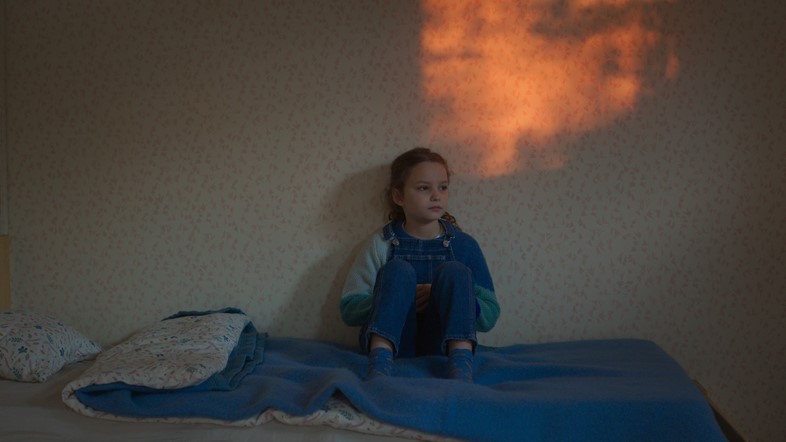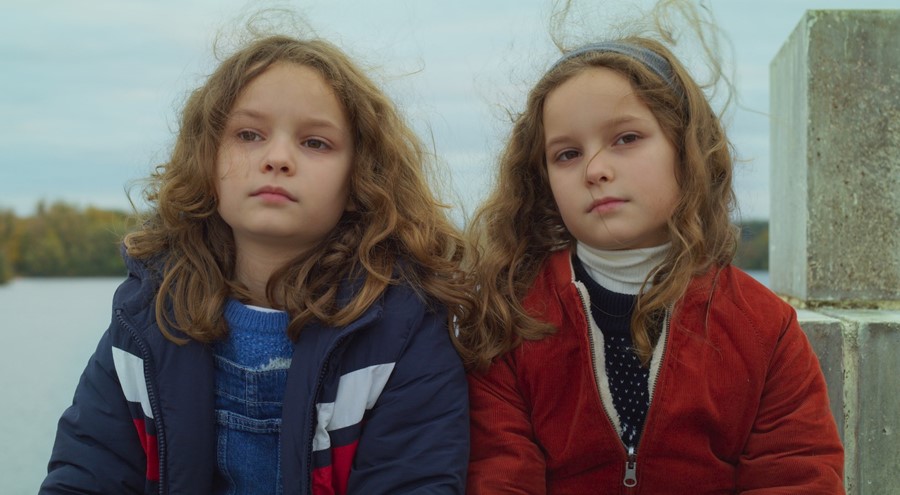The French filmmaker talks her follow-up to Portrait of a Lady on Fire – a small but perfectly formed film about childhood, grief and familial healing
French filmmaker Céline Sciamma makes quiet yet stirring films about the female experience, most often viewed through the eyes of children (think her powerful coming-of-age tale, Tomboy) or teenagers, as in her debut feature Waterlilies and 2014 drama Girlhood. In fact, it is only 2019’s Portrait of a Lady on Fire, her Oscar-nominated period drama and the film for which she is arguably best known, that features an all-adult cast.
Sciamma’s work centres on identity, on blossoming sexuality, on life’s many distinctions and unanswered questions, and for these types of films, she explains, kids and adolescents make the best characters. “They care so much; they really want to understand,” she tells me, sitting in a stuffy hotel conference room ahead of the London Film Festival screening of her latest film, Petite Maman. “When a kid asks you a question, you feel a pressure to answer it well – it’s so genuine. They are looking for some kind of truth, and that’s a great characteristic for the cinema I want to make.”
This is evidenced in abundance in Petite Maman, a small but perfectly formed film (its running time is just 72 minutes) that explores themes of childhood, motherhood and the ties that bond three generations of women: eight-year-old Nelly, her mother Marion, and her recently deceased grandmother.
Nelly is playful and curious, but serious and mature for her age (“you don’t forget, you just don’t listen,” she tells her father shrewdly when he claims to have forgotten a childhood story told to him by his wife). Both she and her mother are grieving the loss of her grandmother, but Marion shares little of her emotions with Nelly, leaving her daughter to ponder the inner workings of her mother’s mind alone.
When Marion abandons her childhood home mid-clear-out, Nelly remains with her father, whiling away her days in the nearby woods where her mother once played. There, she encounters a girl her age, who bears an uncanny resemblance to herself and says her name is Marion. In real life, the actresses (Gabrielle and Josephine Sanz) are twins – “they prefer ‘sisters born on the same day,’” Sciamma interjects when I use this term – but in the film, Nelly begins to suspect that she’s stumbled across a past version of her mother, and the story unfolds from there.
“The film began with this image,” Sciamma explains, “of two little girls building a treehouse in the woods – one obviously the daughter, the other obviously the mother. It felt very peaceful yet troubling and it formed the matrix of the film.” The filmmaker was, she tells me, already writing the script for Petite Maman by the time the pandemic struck, but its arrival was what prompted her to finish it and get the film made. “It suddenly felt much more urgent because it was dealing with kids losing their grandparents, with not being able to say goodbye. It is about collective grief and I felt like it would be a good film to put out in the world when cinemas reopened.”

Inspired by the work of Studio Ghibli co-founder Hayao Miyazaki, and films she enjoyed during her own childhood like Back to the Future and Big, Sciamma always intended that the film appeal to both younger and older viewers. “That’s why it is timeless,” she says, referring to the hard-to-date set design and costume choices. “I really wanted a kid from the 50s and a kid from today to connect equally to this story. I wanted to give everyone their childhood body back, because we always pretend that the kids we were are dead, somehow, even though they’re so much a part of us.”
As with all her previous offerings, what is perhaps most brilliant about Petite Maman is Sciamma’s aptitude for nuance: so much is hinted at by actions and glances rather than words, while the characters are given all the space they need to show what she dubs “their full range”. Nelly and Marion don’t do anything beyond engage in regular childhood pursuits with one another – making pancakes, playing board games, and putting on a hilarious play inspired, Sciamma tells me, by the first film script she wrote as a child – and yet their individual characters are distinct and whole. “That’s what representation is,” the filmmaker enthuses. “It’s not about giving other perspectives, it’s about giving full range, full opportunity, full sincerity to a character. So often kids are portrayed like they’re not fully formed, and part of my aim with this film was for kids to experience the feeling of being seen.”
Sciamma also believes in the power of cinema as a therapeutic tool, and Petite Maman is deeply moving and persuasive in its call for greater understanding between family members. In one early scene, for instance, Nelly ruefully notes that her father and mother never tell her more than “little stories” about their childhood, when what she really wants to know are real things, like what they were scared of. “Petite Maman wants to offer a different narrative to the usual family conflict – a narrative about meeting, about sharing some time. It brings equality to a family because suddenly a mother and daughter are the same age; it’s about sisterhood among generations.”
As our interview draws to a close, Sciamma, wonderfully poetic in her discussion of cinema and her own films alike, shares her particular vision for the impact she hopes Petite Maman will have. “My dream is that a mother and her daughter will watch the film together, and then they’ll have to run to catch the bus, and after seeing the film, they will run differently. They will run differently, together.”
Petite Maman is in cinemas nationwide from November 19, 2021
